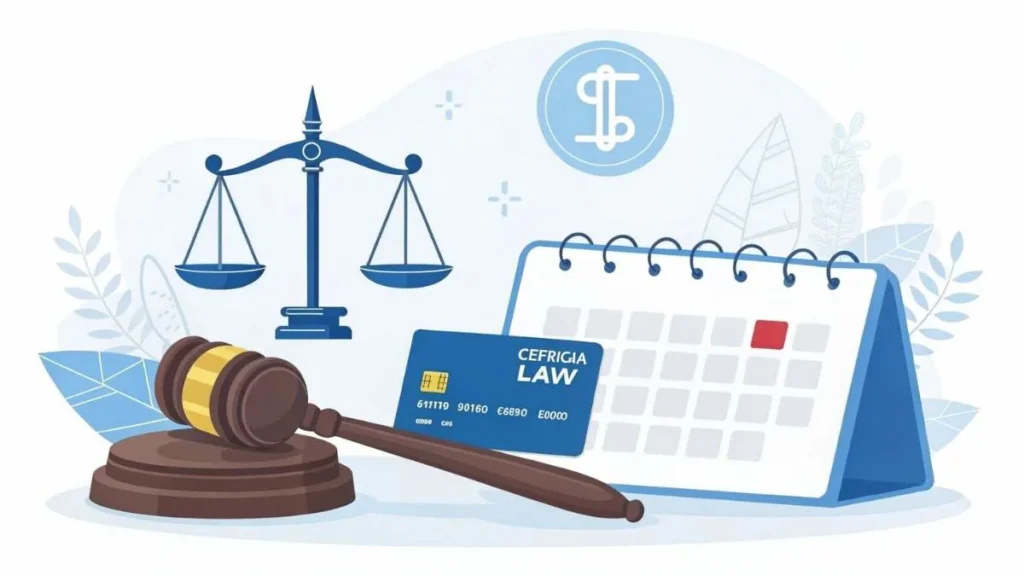
If you’ve fallen behind on credit card payments in Georgia, you might be wondering how long debt collectors or credit card companies can legally come after you. The answer depends on something called the statute of limitations—a law that sets a time limit for creditors to sue you over unpaid debt.
Understanding Georgia’s rules is important because debt collectors sometimes pursue old debts even when they’re no longer legally enforceable in court. This article breaks down what the statute of limitations means, how Georgia law applies to credit card debt, and what steps you can take to protect yourself.
What Is a Statute of Limitations on Debt?
The statute of limitations is the time period a creditor or debt collector has to file a lawsuit against you to collect a debt.
- Once this time expires, the debt is considered “time-barred.”
- Creditors can no longer win a lawsuit for the debt in court.
- However, the debt itself doesn’t disappear—you may still get calls or letters asking you to pay.
The statute of limitations acts as a legal defense. If you’re sued after the time has passed, you can raise it in court and the case may be dismissed.
Georgia’s Statute of Limitations for Credit Card Debt
In Georgia, the statute of limitations for most credit card debt is 6 years.
- Georgia law (O.C.G.A. § 9-3-24) sets a six-year statute of limitations for written contracts.
- Credit card agreements are typically treated as written contracts rather than just open accounts.
- This means that if you default on your credit card debt, the creditor has six years from the date of your last payment or default to sue you in court.
Example: If you stopped making payments in January 2020, the creditor generally has until January 2026 to file a lawsuit.
When Does the Statute of Limitations Clock Start?
The “clock” on the statute of limitations usually starts ticking when you:
- Miss a payment and default on the account, or
- Make your last payment before stopping completely.
For most credit card debts in Georgia, it’s the date of the last activity on the account that matters.
That’s why it’s critical to know your payment history. Even a small payment can reset the clock (more on that below).
What Happens After the Statute of Limitations Expires?
Once the 6-year statute of limitations has passed in Georgia:
- Creditors cannot successfully sue you in court. If they do file, you can use the statute of limitations as a defense.
- Debt collectors may still contact you. They are legally allowed to ask you to pay, but they cannot threaten or mislead you into thinking you can be sued.
- The debt still exists. It doesn’t disappear from your credit report right away—it can typically remain for up to 7 years from the date of your first missed payment.
Important: The statute of limitations doesn’t erase the debt—it only limits the creditor’s legal ability to enforce it through the courts.
Risks of Restarting the Statute of Limitations
In Georgia, certain actions can restart the 6-year clock, giving creditors a new window to sue:
- Making a partial payment on the debt.
- Acknowledging in writing that you owe the debt.
- Entering into a new payment agreement.
This is why consumer advocates warn against making payments on very old debt without verifying its legal status first. A simple $10 payment could revive a debt that was otherwise unenforceable.
Consumer Protections in Georgia
Consumers in Georgia are protected by both federal and state laws when it comes to debt collection:
Federal Protections
- Fair Debt Collection Practices Act (FDCPA): Debt collectors cannot harass you, threaten you, or lie about your rights. They must provide written proof of the debt if you request it.
Georgia-Specific Protections
- Georgia courts recognize the statute of limitations as a valid defense in debt lawsuits.
- If a creditor files a case after the statute has run out, you can ask the judge to dismiss it.
Steps to Take If You’re Contacted About Old Debt
If a debt collector contacts you in Georgia, especially about a debt you think is old, here are steps you can take:
- Don’t panic or agree to pay right away.
- First, figure out how old the debt is.
- Request debt validation.
- Under federal law, you can ask the collector to provide written proof that the debt is yours and that they have the right to collect it.
- Check the statute of limitations.
- Review your last payment date and Georgia’s 6-year rule.
- Avoid making small payments.
- Even a small payment can restart the clock and give creditors more time to sue.
- Keep records.
- Save all communication, payment history, and letters you send or receive.
- Seek legal advice if sued.
- If you’re taken to court, contact a consumer rights attorney. Many offer free consultations or low-cost help.
Read Also- First-Time Offense Credit Card Theft in Texas
Frequently Asked Questions (FAQ)
Can a debt collector still sue me after 6 years in Georgia?
Yes, they can file a lawsuit, but you can raise the statute of limitations as a defense. If you do, the case will likely be dismissed.
Does the statute of limitations erase my credit card debt?
No. The debt still exists, and it may remain on your credit report for up to 7 years. The statute only limits lawsuits.
What if I make a payment on an old debt?
Making a payment can restart the statute of limitations in Georgia, giving collectors another 6 years to sue.
How do I know when the statute of limitations started on my debt?
It usually begins with the date of your last payment or the date you first went into default. Reviewing your account history can help.
What should I do if I get sued for old credit card debt in Georgia?
Don’t ignore the lawsuit. Respond in court and raise the statute of limitations as a defense. Seek legal advice immediately.
Are debt collectors allowed to harass me in Georgia?
No. Both federal and state laws prohibit harassment, threats, and misleading statements by debt collectors.
Conclusion
The Georgia statute of limitations on credit card debt is six years, starting from your last payment or default. Once that period passes, creditors cannot legally win a lawsuit against you—but the debt may still show up on your credit report and collectors may continue to contact you.
Knowing your rights can help you avoid restarting the clock or falling into traps set by aggressive collectors. If you’re facing a lawsuit or dealing with old debt, it’s wise to consult a qualified attorney who understands Georgia debt collection laws.
Key takeaway: Always verify the age of a debt before making any payment or agreement, and don’t hesitate to stand up for your legal rights under Georgia law.

Emma Rose is a U.S.-based personal finance writer and a regular contributor at Cardix.us. She focuses on topics like credit cards, credit scores, and everyday money management. Emma’s writing makes complex financial concepts simple and practical, helping readers make smarter credit and spending decisions with confidence.


